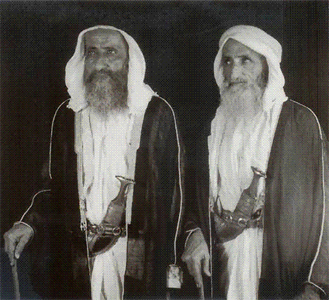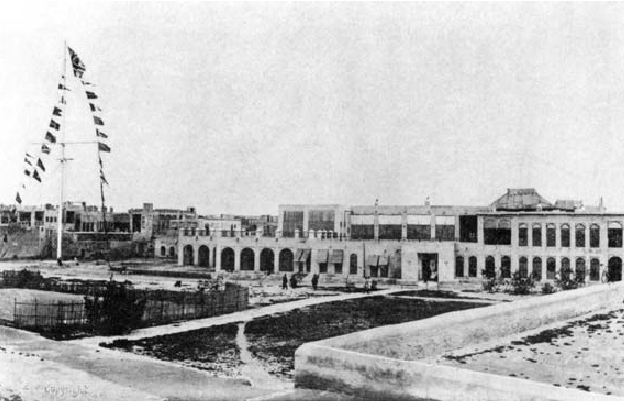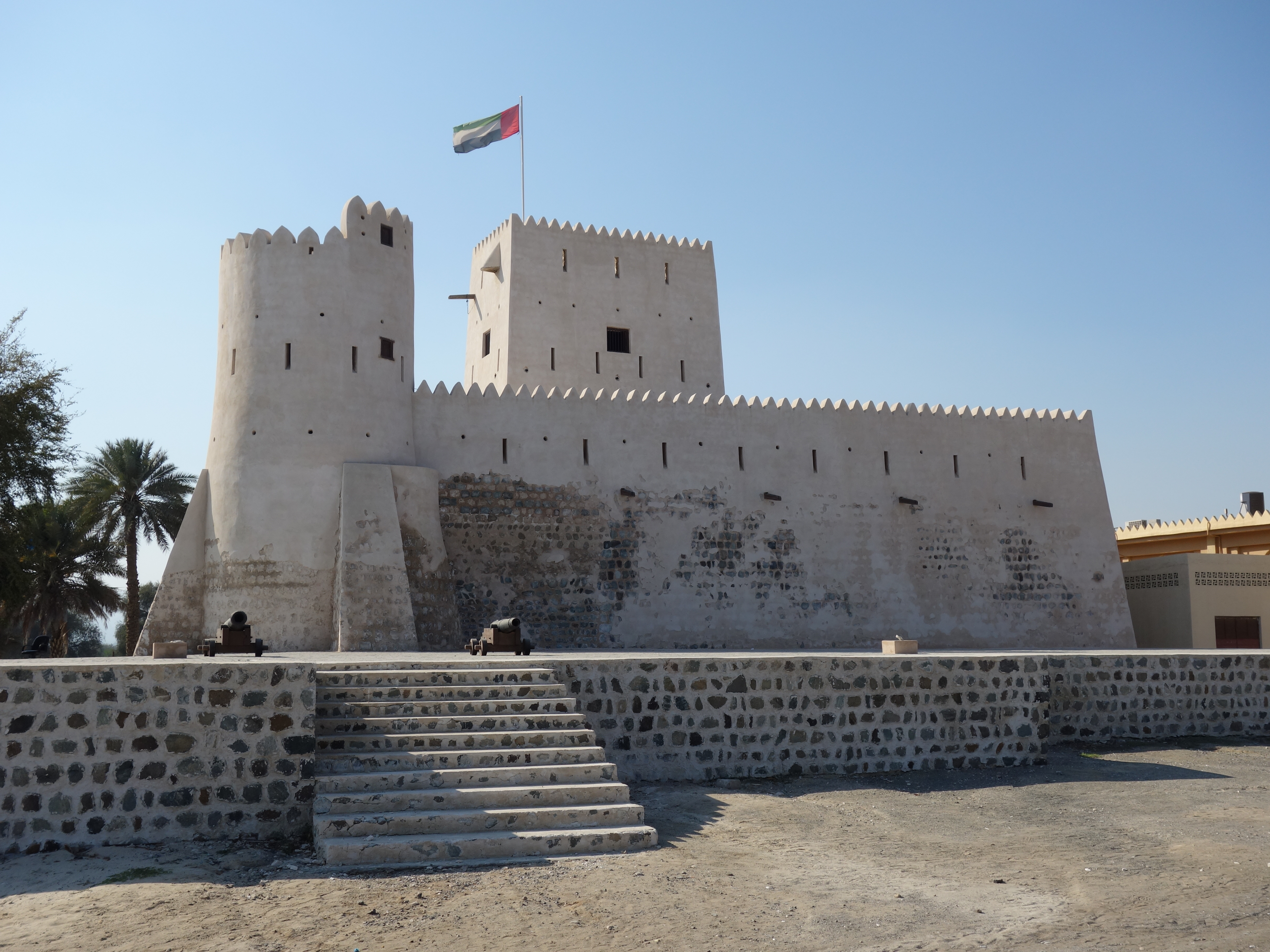|
Hamad Bin Abdullah Al Sharqi
Sheikh Hamad bin Abdullah Al Sharqi was the first recognised leader of the Al Sharqi Ruling family of Fujairah, one of the Trucial States and today one of the United Arab Emirates (UAE). He led Fujairah in a number of insurrections against Al Qasimi rule, presiding over a turbulent time when the emirate was practically independent but denied recognition of status as a Trucial State in its own right by the British. Insurrection Hamad was headman of Fujairah town in 1879 when he led an insurrection in spring of that year against Sheikh Saqr bin Khalid Al Qasimi of Sharjah, who claimed suzerainty over the Gulf of Oman coast (known as Shamaliyah) and had placed a slave named Sarur in charge of Fujairah. This followed a prolonged period of contested ownership of areas of the coast between the Al Qasimi of Sharjah and Ras Al Khaimah and the Sultan of Muscat. The insurrection replaced Sarur and a delegation was sent to Sheikh Saqr but they were badly received, imprisoned and a force ... [...More Info...] [...Related Items...] OR: [Wikipedia] [Google] [Baidu] |
Sheikh
Sheikh (pronounced or ; ar, شيخ ' , mostly pronounced , plural ' )—also transliterated sheekh, sheyikh, shaykh, shayk, shekh, shaik and Shaikh, shak—is an honorific title in the Arabic language. It commonly designates a chief of a tribe or a royal family member in Arabian countries, in some countries it is also given to those of great knowledge in religious affairs as a surname by a prestige religious leader from a chain of Sufi scholars. It is also commonly used to refer to a Muslim religious scholar. It is also used as an honorary title by people claiming to be descended from Hasan ibn Ali and Husayn ibn Ali both patrilineal and matrilineal who are grandsons of the Islamic prophet Muhammad. The term is literally translated to " Elder" (is also translated to "Lord/Master" in a monarchical context). The word 'sheikh' is mentioned in the 23rd verse of Surah Al-Qasas in the Quran. Etymology and meaning The word in Arabic stems from a triliteral root connected with a ... [...More Info...] [...Related Items...] OR: [Wikipedia] [Google] [Baidu] |
Al Bithnah
, nickname = , motto = , image_skyline = , image_caption = , image_flag = , image_seal = , image_map = , map_caption = , pushpin_map = United Arab Emirates , subdivision_type = Country , subdivision_name = , subdivision_type1 = Emirate , subdivision_name1 = Fujairah , subdivision_name2 = , established_title = , established_date = , established_title2 = , established_date2 = , government_type = , leader_title = , leader_name = , area_magnitude = , area_total_sq_mi = , area_total_km2 = , area_land_sq_mi = , ar ... [...More Info...] [...Related Items...] OR: [Wikipedia] [Google] [Baidu] |
19th-century Monarchs In The Middle East
The 19th (nineteenth) century began on 1 January 1801 ( MDCCCI), and ended on 31 December 1900 ( MCM). The 19th century was the ninth century of the 2nd millennium. The 19th century was characterized by vast social upheaval. Slavery was abolished in much of Europe and the Americas. The First Industrial Revolution, though it began in the late 18th century, expanding beyond its British homeland for the first time during this century, particularly remaking the economies and societies of the Low Countries, the Rhineland, Northern Italy, and the Northeastern United States. A few decades later, the Second Industrial Revolution led to ever more massive urbanization and much higher levels of productivity, profit, and prosperity, a pattern that continued into the 20th century. The Islamic gunpowder empires fell into decline and European imperialism brought much of South Asia, Southeast Asia, and almost all of Africa under colonial rule. It was also marked by the collapse of the large ... [...More Info...] [...Related Items...] OR: [Wikipedia] [Google] [Baidu] |
Sheikhs Of The Emirate Of Fujairah
Sheikh (pronounced or ; ar, شيخ ' , mostly pronounced , plural ' )—also transliterated sheekh, sheyikh, shaykh, shayk, shekh, shaik and Shaikh, shak—is an honorific title in the Arabic language. It commonly designates a chief of a tribe or a royal family member in Arabian countries, in some countries it is also given to those of great knowledge in religious affairs as a surname by a prestige religious leader from a chain of Sufi scholars. It is also commonly used to refer to a Muslim religious scholar. It is also used as an honorary title by people claiming to be descended from Hasan ibn Ali and Husayn ibn Ali both patrilineal and matrilineal who are grandsons of the Islamic prophet Muhammad. The term is literally translated to "Elder" (is also translated to "Lord/Master" in a monarchical context). The word 'sheikh' is mentioned in the 23rd verse of Surah Al-Qasas in the Quran. Etymology and meaning The word in Arabic stems from a triliteral root connected with ag ... [...More Info...] [...Related Items...] OR: [Wikipedia] [Google] [Baidu] |
Vali (governor)
''Wāli'', ''Wā'lī'' or ''vali'' (from ar, والي ''Wālī'') is an administrative title that was used in the Muslim World (including the Caliphate and Ottoman Empire) to designate governors of administrative divisions. It is still in use in some countries influenced by Arab or Muslim culture. The division that a ''Wāli'' governs is called ''Wilayah'', or in the case of Ottoman Turkey, "''Vilayet''". The title currently also refers to the ceremonial head of the Bangsamoro, a Muslim-majority autonomous region of the Philippines. Algerian term In Algeria, a ''wāli'' is the "governor" and administrative head of each of the 58 provinces of the country, and is chosen by the president. Iranian term In Iran the term is known as Vāli and refers to the governor-general or local lord of an important province. During the Safavid reign 1501-1722 the former rulers of the then subordinated provinces of the Georgian Kartli and Kakheti kingdom, the Kurdish emirate of Ardalan, ... [...More Info...] [...Related Items...] OR: [Wikipedia] [Google] [Baidu] |
Emirate Of Abu Dhabi
The Emirate of Abu Dhabi (, , or ; ar, إِمَارَةْ أَبُوظَبِي , ) is one of seven emirates that constitute the United Arab Emirates (UAE). It is by far the largest emirate, accounting for 87% of the nation's total land area or 67,340 km2 (or 26,000 sq mi). Abu Dhabi also has the second-largest population of the seven emirates. In June 2011 this was estimated to be 2,120,700 people, of which 439,100 people (less than 21%) were Emirati citizens. The city of Abu Dhabi, after which the emirate is named, is the capital of both the emirate and federation. In the early 1970s, two important developments influenced the status of the Emirate of Abu Dhabi. The first was the establishment of the United Arab Emirates in December 1971, with Abu Dhabi as its political and administrative capital. The second was the sharp increase in oil prices following the October 1973 War, which accompanied a change in the relationship between the oil countries and foreign oil companies, ... [...More Info...] [...Related Items...] OR: [Wikipedia] [Google] [Baidu] |
Persian Gulf Residency
The Persian Gulf Residency () was an official colonial subdivision (i.e., residency) of the British Raj from 1763 until 1947 (and remained British protectorates after Indian independence in 1947, up to 1971), whereby the United Kingdom maintained varying degrees of political and economic control over several states in the Persian Gulf, including what is today known as the United Arab Emirates (formerly called the "Trucial States") and at various times southern portions of Persia, Bahrain, Kuwait, Oman, and Qatar. Historical background until 1900 British interest in the Persian Gulf originated in the sixteenth century and steadily increased as British India's importance rose in the imperial system of the eighteenth and nineteenth centuries. In the beginning, the agenda was primarily of a commercial character. Realizing the region's significance, the British fleet supported the Persian emperor Shāh Abbās in expelling the Portuguese from Hormuz Island in 1622. In return, the ... [...More Info...] [...Related Items...] OR: [Wikipedia] [Google] [Baidu] |
Ajman
Ajman ( ar, عجمان, '; Gulf Arabic: عيمان ʿymān) is the capital of the emirate of Ajman in the United Arab Emirates. It is the fifth-largest city in UAE after Dubai, Abu Dhabi, Sharjah and Al Ain. Located along the Persian Gulf, it is engulfed by the larger emirate of Sharjah in territory. History Al Bu Kharaiban Nuaimi rule in Ajman started in 1816, when Sheikh Rashid bin Humaid Al Nuaimi and fifty of his followers took the coastal settlement of Ajman from members of the Al Bu Shamis Nuaimi tribe in a short conflict. It wasn't until 1816 or 1817, however, that the Ajman fort finally fell to Rashid's followers and his rule was endorsed by the powerful Sheikh of neighbouring Sharjah and Ras Al Khaimah, Sheikh Sultan bin Saqr Al Qasimi. On 8 January 1820, following the sack of Ras Al Khaimah by a British force led by Sir W.G. Keir, Sultan bin Saqr signed the General Maritime Treaty with the United Kingdom on 4 February 1820, followed on 15 March by Rashid bin Humaid ... [...More Info...] [...Related Items...] OR: [Wikipedia] [Google] [Baidu] |
Dubai
Dubai (, ; ar, دبي, translit=Dubayy, , ) is the most populous city in the United Arab Emirates (UAE) and the capital of the Emirate of Dubai, the most populated of the 7 emirates of the United Arab Emirates.The Government and Politics of the Middle East and North Africa. D Long, B Reich. p.157 Established in the 18th century as a small fishing village, the city grew rapidly in the early 21st century with a focus on tourism and luxury, having the second most five-star hotels in the world, and the tallest building in the world, the Burj Khalifa, which is tall. In the eastern Arabian Peninsula on the coast of the Persian Gulf, it is also a major global transport hub for passengers and cargo. Oil revenue helped accelerate the development of the city, which was already a major mercantile hub. A centre for regional and international trade since the early 20th century, Dubai's economy relies on revenues from trade, tourism, aviation, real estate, and financial services. [...More Info...] [...Related Items...] OR: [Wikipedia] [Google] [Baidu] |
Bedouin
The Bedouin, Beduin, or Bedu (; , singular ) are nomadic Arab tribes who have historically inhabited the desert regions in the Arabian Peninsula, North Africa, the Levant, and Mesopotamia. The Bedouin originated in the Syrian Desert and Arabian Desert but spread across the rest of the Arab world in West Asia and North Africa after the spread of Islam. The English word ''bedouin'' comes from the Arabic ''badawī'', which means "desert dweller", and is traditionally contrasted with ''ḥāḍir'', the term for sedentary people. Bedouin territory stretches from the vast deserts of North Africa to the rocky sands of the Middle East. They are traditionally divided into tribes, or clans (known in Arabic as ''ʿašāʾir''; or ''qabāʾil'' ), and historically share a common culture of herding camels and goats. The vast majority of Bedouins adhere to Islam, although there are some fewer numbers of Christian Bedouins present in the Fertile Crescent. Bedouins have been referred ... [...More Info...] [...Related Items...] OR: [Wikipedia] [Google] [Baidu] |
Kalba
Kalba () is a city in the Emirate of Sharjah in the United Arab Emirates (UAE). It is an exclave of Sharjah lying on the Gulf of Oman coast north of Oman. Khor Kalba (Kalba Creek), an important nature reserve and mangrove swamp, is located south of the town by the Omani border. Kalba Mangrove reserve is open to the public and was developed as an eco-tourism resort by the Sharjah Investment and Development Authority (Shurooq). A number of conservationists and ecologists have expressed concern regarding the project. History Shell middens dating back to the fourth millennium BCE have been found at Kalba, as well as extensive remains of Umm Al Nar era settlement. Portuguese The town was captured by the Portuguese Empire in the 16th century and was referred to as ''Ghallah''. It was part of a series of fortified cities that the Portuguese used to control access to the Persian Gulf and the Gulf of Oman, e.g. Khor Fakan, Muscat, Sohar, Seeb, Qurayyat, Muttrah. Kalba Fort, tod ... [...More Info...] [...Related Items...] OR: [Wikipedia] [Google] [Baidu] |
Al Bithnah Fort 4
AL, Al, Ål or al may stand for: Arts and entertainment Fictional characters * Al (''Aladdin'') or Aladdin, the main character in Disney's ''Aladdin'' media * Al (''EastEnders''), a minor character in the British soap opera * Al (''Fullmetal Alchemist'') or Alphonse Elric, a character in the manga/anime * Al Borland, a character in the ''Home Improvement'' universe * Al Bundy, a character in the television series ''Married... with Children'' * Al Calavicci, a character in the television series ''Quantum Leap'' * Al McWhiggin, a supporting villain of ''Toy Story 2'' * Al, or Aldebaran, a character in ''Re:Zero − Starting Life in Another World'' media Music * ''A L'', an EP by French singer Amanda Lear * ''American Life'', an album by Madonna Calendar * Anno Lucis, a dating system used in Freemasonry Mythology and religion * Al (folklore), a spirit in Persian and Armenian mythology * Al Basty, a tormenting female night demon in Turkish folklore * ''Liber AL'', the ce ... [...More Info...] [...Related Items...] OR: [Wikipedia] [Google] [Baidu] |











